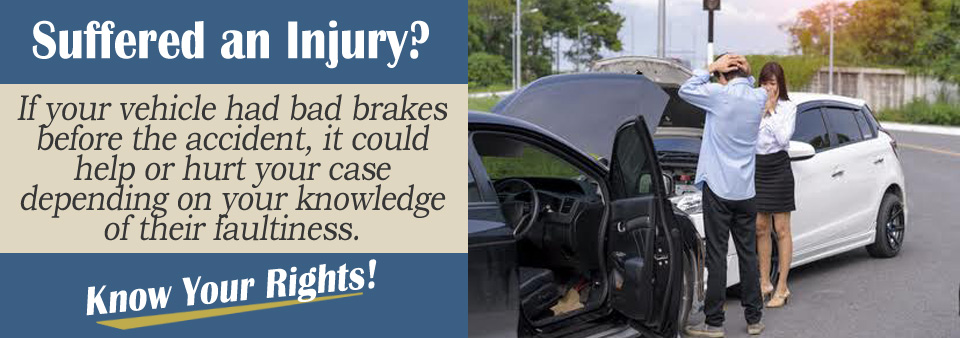You are driving along the road and suddenly, your brakes give out. You crash right into another car. You certainly were not intending to crash into the other car, but it happened. However, it happened, and now you need to know the next step.
Will the other party’s insurance company use this fact against you in the long run?
We have asked attorney, Alaina Sullivan, about what you should do. Here is what she had to say:
Bad Brakes Affect Your Case
In a car accident, the totality of the circumstances is considered, and that does include the mechanical functionality of the car. If the brakes are faulty, that should be considered as a factor leading to the accident.
It can help your case, and it can hurt your case, depending on your knowledge of their faultiness and how much of a part they played into the accident.
Products Liability
If the brake failure was a product of poor production, the injured driver can seek damages from the manufacturer and the dealer who sold the car to you. It can be done in situations where the defect was that the brakes were poorly made or poorly designed.
The other side would need to prove that the defect was unreasonably dangerous, that it caused his or her injury and that your car had not been substantially changed since it was sold.
Why would you seek recovery from a party other than the other driver? For one, the chances of payment are definitely higher. A company would more likely have deeper pockets than an individual, and the company would also more than likely settle out of court to avoid a lengthy lawsuit.

Driver Fault
Of course, the manufacturer is not the only individual/entity at fault. The driver also to be handling the vehicle in a reasonable manner. If you are driving too closely to the vehicle in front of you, and your brakes would not have stopped in time, even if they were functioning properly, you would be held liable.
Of course, the brakes could reduce your liability, but they should not write it off all together. As the driver, you hold a level of responsibility to conduct yourself properly while driving. If you were distracted or you were acting irresponsible, then you are responsible for the accident in some manner.
Knowledge of the Defect
If you knew that your car’s brakes were questionable and could potentially give out, but yet you drove your car despite this knowledge, you could be considered negligent and that would definitely harm your case.
In fact, that could up the damages you could potentially pay out if the court or insurance company finds that your negligence in knowingly driving a car with faulty brakes was reckless behavior.
Contact an Attorney Today
If you were in a collision with another car due to your brakes giving out, you need to speak with an attorney to discuss your case. A licensed personal injury attorney will be able to evaluate your case and determine if you have a claim against the other party’s insurance company.
To receive the compensation for your medical bills, property damages, and pain and suffering, you should speak with a personal injury attorney in your area today.